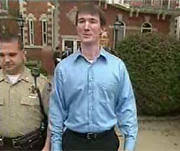
(UNDATED) – Indiana Attorney General Curtis Hill is asking a judge to keep the man convicted of killing Indiana University student Jill Behrman in jail until he can complete an appeal of his release.

In October, US District Court Judge James R. Sweeny of the Southern District of Indiana ruled John Myers II, who was found guilty of murdering 19-year-old Jill Behrman, had ineffective legal counsel and will be released from prison unless the state files for a retrial.
Hill’s Jan. 8 motion asks the judge to delay Myers’ release by 60 days, or until the appeal is concluded. Hill claims the extra 60 days would avoid unnecessary taxing of the state judicial resources, avoid potential legal conflicts of interest and allow time for the Seventh Circuit to address the “novel legal issue” presented by the case. Hill writes that the extension would prevent a retrial if the appeal is successful.
Myers was convicted of killing Behrman in 2006 and sentenced to serve the maximum sentence 65 years in prison. He is serving that sentence at the Indiana State Prison in Michigan City.

Behrman disappeared in May 2000 while on a bicycle ride near Bloomington. Hunters found her remains in 2003 in Morgan County, north of Bloomington. She died of a shotgun wound to the back of her head.
In his petition to the court, Myers argued that his counsel was ineffective, that the state presented false evidence and that the state withheld evidence that could have cleared him.
Judge Sweeney ruled ineffective counsel violated Myers’ Sixth Amendment rights.
“After reviewing the record and the parties’ briefs in detail, the Court concludes that Mr. Myers received ineffective assistance of counsel at trial in violation of his Sixth Amendment rights Most notably, Mr. Myers’s counsel made false statements to the jury during opening arguments, which counsel admitted to the Indiana Supreme Court in a subsequent attorney disciplinary proceeding.”
“Most notably, Mr. Myers’s counsel made false statements to the jury during opening arguments, which counsel admitted to the Indiana Supreme Court in a subsequent attorney disciplinary proceeding. He also failed to object to two significant categories of evidence that should not have been presented to the jury. In the end, these serious errors all but destroyed the defense that trial counsel presented to the jury and tainted the entire trial.”
Patrick Baker was the lead attorney on Myers’ case.



